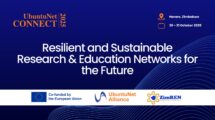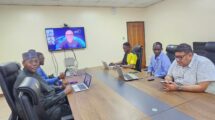The AfricaConnect project and its partners get a mention in the paper “In Praise of the Great Open Conversation of Science” – a summary of key messages from the 2nd United Nations Open Science Conference which was held on July 21-23 2021 – for their work on LIBSENSE.
“The COVID-19 pandemic has made clear the interconnected nature of the systems behind research creation and of the platforms on which this research circulates; it was these transnational systems that allowed us to tap into our collective global capacity in the throes of the pandemic. Speakers warned that the current science system, rooted in proxy metrics, breeds non-collaborative practices, a quality and replication crisis, expensive commercial publication markets, while widely encouraging short-termism, and risk aversion, novelty and quantity over quality, relevance, and impact. In the current reward system in science, society is largely absent from the credibility cycle; a cycle painted with hypercompetition for limited funds, too little room for team-science, most papers still behind paywalls, data not shared, and quality defined in purely quantitative terms (number of articles, journal impact factor, citations, H-index, amount of funding obtained). For science to better reflect societal needs, Open Science principles must be applied to increase the quality, progress, and scientific and societal impact of research and scholarship. This can be achieved through changing incentives and rewards to better engage with relevant and representative stakeholders, to define problems and discuss ongoing research, share results throughout the work life cycle, and publish openly accessible research results. Such work is already underway in Africa, Europe, Latin and North America. For example, with the pan-African project AfricaConnect in place since 2011 and three regional networks – ASREN, WACREN, and UbuntuNet Alliance – that continue to grow, African libraries are now joining the cause through LIBSENSE (Libraries Support for Embedded NREN Services and Einfrastructure) which is an effort to foster collaboration between libraries and research networks.”
To learn more about LIBSENSE, visit https://spaces.wacren.net/display/LIBSENSE/Home
Read the full document here.





